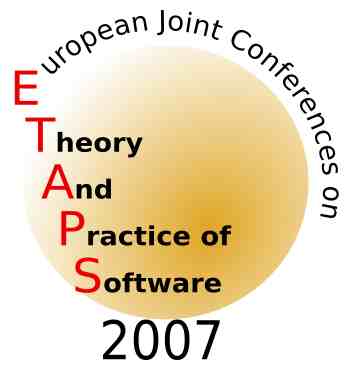|
|
History
QAPL is an international workshop on quantitative aspects of programming languages.
Its first edition, QAPL 2001, was
held in Florence, Italy. It was a satellite event to the ACM Principles, Logics, and Implementations of high-level
programming languages, PLI 2001.
The proceedings appeared as volume 59(3) of ENTCS.
Its second edition, QAPL 2004,
was held in Barcelona, Spain. Since then, it has become a yearly appointment with ETAPS.
The proceedings appeared as volume 112 of ENTCS.
Based on the QAPL 2004 event, a special
issue of the journal Theoretical Computer Science was published in volume 346(1).
The third edition, QAPL 2005, was
held in Edinburgh, UK. The 2006 edition took place in Vienna, Austria. Also the proceedings of these last two
editions will appear in ENTCS.
Scope
Quantitative aspects of computation are important and sometimes
essential in characterising the behaviour and determining the
properties of systems. They are related to the use of physical
quantities (storage space, time, bandwidth, etc.) as well as
mathematical quantities (e.g. probability and measures for
reliability, security and trust). Such quantities play a central
role in defining both the model of systems (architecture, language
design, semantics) and the methodologies and tools for the analysis
and verification of system properties.
The aim of this workshop is to discuss the explicit use of
quantitative information such as time and probabilities either
directly in the model or as a tool for the analysis of systems.
In particular, the workshop focuses on:
-
the design of probabilistic and real-time languages and the definition of semantical models for
such languages;
-
the discussion of methodologies for the analysis of probabilistic and timing properties
(e.g. security, safety, schedulability) and of other quantifiable properties such as reliability (for hardware
components), trustworthiness (in information security) and resource usage (e.g., worst-case memory/stack/cache
requirements);
-
the probabilistic analysis of systems which do not explicitly incorporate quantitative aspects
(e.g. performance, reliability and risk analysis);
-
applications to safety-critical systems, communication protocols, control systems, asynchronous
hardware, and to any other domain involving quantitative issues.
Topics
Topics include (but are not limited to) probabilistic, timing and
general quantitative aspects in:
| Language design |
Information systems |
Asynchronous HW analysis |
| Language extension |
Multi-tasking systems |
Automated reasoning |
| Language expressiveness |
Logic |
Verification |
| Quantum languages |
Semantics |
Testing |
| Time-critical systems |
Performance analysis |
Safety |
| Embedded systems |
Program analysis |
Risk and hazard analysis |
| Coordination models |
Protocol analysis |
Scheduling theory |
| Distributed systems |
Model-checking |
Security |
| Biological systems |
Concurrent systems |
|
